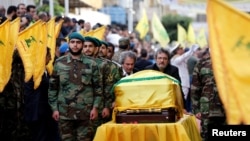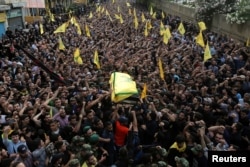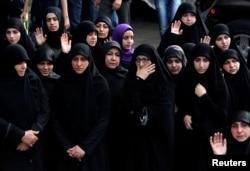The Lebanese militant group Hezbollah buried a top military commander Friday after he was killed in an attack in Syria, where the group has deployed thousands of fighters.
Hezbollah fighters carried the coffin of Mustafa Badreddine through the streets of southern Beirut in a funeral procession.
Badreddine, 55, led the Shi'ite group’s involvement in the Syrian civil war and was the highest official from the group to die since Hezbollah entered the conflict several years ago.
Without giving any specific time, Hezbollah said Badreddine was killed in a big explosion targeting one of its bases near Damascus' airport.
No one immediately claimed responsibility for the killing.
Investigation
Hezbollah said it was investigating the cause of the explosion, saying the probe would determine whether an airstrike, missile attack or artillery bombardment had caused the blast.
Badreddine was a top adviser of Hezbollah leader Sayyed Hassan Nasrallah. The group has been fighting alongside troops loyal to Syrian President Bashar al-Assad. Hezbollah says the war is necessary to protect Shi'ites from Sunni extremists who have been at the forefront of the Syrian opposition.
Hezbollah's deployment of fighters to Syria has increased the group's enemies beyond its traditional rival, Israel, to include Sunni extremists.
The U.S. does not have information on who was behind the attack that killed Badreddine, State Department spokesman John Kirby said.
No coalition aircraft nearby
White House spokesman Josh Earnest said there were no U.S. or coalition aircraft in the area where Badreddine was reported to have been killed.
Kirby noted that Badreddine was convicted in Kuwait for his role in bomb attacks on the U.S. and French embassies in 1983. Badreddine escaped from prison in Kuwait after the country was invaded by Iraq under the leadership of Saddam Hussein in 1990.
Badreddine was also one of four men accused in absentia of plotting the 2005 assassination of former Lebanese Prime Minister Rafik Hariri and 21 others. The trial began in 2014 at The Hague, Netherlands, and is ongoing. Hezbollah denied any involvement in the attack.
The U.S. Treasury Department imposed sanctions on Badreddine in 2011 and 2015 for his involvement in the Syrian war.
According to U.S. officials, Assad and Nasrallah coordinated Hezbollah's actions in Syria on a weekly basis, with Badreddine present at top Damascus meetings.
Announcing his death, Hezbollah said Badreddine had told his friends and family several months ago that he would return from Syria victorious or "a martyr." The group released a picture, showing a smiling Badreddine wearing a camouflage baseball cap.
Nadim Shehadi, who heads the Fares Center at Tufts University’s Fletcher School of Law and Diplomacy, tells VOA that Badreddine and other suspects in the Hariri case have been dying off quickly.
“Everyone we know connected to the Hariri assassination is dying, so very soon you will have a [special] tribunal in the Hague that is not able to have a trial or that would have to innovate to have a trial, because Badreddine was the highest profile [in the case] and now he’s gone,” he said.
Other deaths
Other suspects who have been killed or died under mysterious circumstances in recent years include top Syrian intelligence officials Rustom Ghazaleh and Jamaa Jamaa, and Badreddine’s brother-in-law, Imad Mughniyah, who was Hezbollah’s former top military commander until he was assassinated in 2008.
“People like Badreddine and Mughniyah,” argued Shehadi, “belong to the darker side of institutions and are not supposed to be well-known."
"Once they are known and become too exposed,” he added, “they become a liability to their own people.”
There was no official reaction from Israel, which customarily declines to comment on such matters.
Yaakov Amidror, a former national security adviser to Prime Minister Benjamin Netanyahu, told Israeli Army Radio that Badreddine’s passing was “good for Israel,” but added that “those [fighting] in Syria ... have a lot of [enemies other than] Israel.”
VOA's Edward Yeranian contributed to this report from Cairo.
Who was Badreddine?
- Took part in most Hezbollah operations since 1982
- Accused of participating in 1983 attacks on U.S. Marine command center and embassy in Beirut
- Suspected of attack on Khobar Towers in Saudi Arabia in 1996
- Condemned to death in Kuwait in 1983 for assassination attempt on Kuwait’s late Emir Sa’ad Jabbar al Sabah.
- Shi’ite gunmen who hijacked a TWA plane in 1985 demanded his freedom
- Escaped Kuwait after Iraqi troops invaded in 1990
- A top suspect in the assassination of former Lebanese Prime Minister Rafiq Hariri in 2005







